A New Approach for Generating Human Biometeorological Information Based on Gridded High-Resolution Data (Basic Data of Test-Reference-Years)
Abstract
:1. Introduction
2. Data and Method
2.1. Data
2.2. Method
2.2.1. Calculation Procedure
2.2.2. Identifying Days with Heat Stress and Cold Stimulus
2.2.3. Climate-Tourism/Transfer-Information-Scheme
2.3. Study Area
3. Results
3.1. Study Area of Southern Baden
3.2. Comparision of Freiburg with a Health Resort in the Black Forest
3.3. Comparison of Results with a Bioclimatic Map of DWD
4. Discussion
4.1. Appropriate Preparation and Assessment of Climate Data
4.2. Assessment of Human-Biometeorological Methods
4.3. Appropriate Visualisation of Results
5. Conclusions
Author Contributions
Funding
Conflicts of Interest
References
- Jendritzky, G. The atmospheric environment—An introduction. Experientia 1993, 49, 733–740. [Google Scholar] [CrossRef]
- Basu, R.; Samet, J.M. Relation between elevated ambient temperature and mortality: A review of the epidemiologic evidence. J. Epidemiol. Rev. 2002, 24, 190–202. [Google Scholar] [CrossRef]
- Parsons, K. Human Thermal Environments: The Effects of Hot, Moderate, and Cold Environments on Human Health, Comfort, and Performance; CRC Press: Boca Raton, FA, USA, 2014. [Google Scholar]
- Staiger, H.; Laschewski, G.; Matzarakis, A. Selection of Appropriate Thermal Indices for Applications in Human Biometeorological Studies. Atmosphere 2019, 10, 18. [Google Scholar] [CrossRef]
- Jendritzky, G.; Menz, G.; Schmidt-Kessen, W.; Schirmer, H. Methodik der räumlichen Bewertung der thermischen Komponente im Bioklima des Menschen (Fortgeschriebenes Klima-Michel-Modell); Beiträge der Akademie für Raumforschung und Landesplanung: Hannover, Germany, 1990. [Google Scholar]
- Staiger, H.; Bucher, K.; Jendritzky, G. Gefühlte Temperatur. Die physiologisch gerechte Bewertung von Wärmebelastung und Kältestress beim Aufenthalt im Freien in der Maßzahl Grad Celsius. Annalen der Meteorologie 1997, 33, 100–107. [Google Scholar]
- Staiger, H.; Laschewski, G.; Grätz, A. The perceived temperature—A versatile index for the assessment of the human thermal environment. Part A: Scientific basics. Int. J. Biometeorol. 2012, 56, 165–176. [Google Scholar] [CrossRef]
- Mayer, H.; Höppe, P. Thermal comfort of man in different urban environments. Theor. Appl. Climatol. 1987, 38, 43–49. [Google Scholar] [CrossRef]
- VDI. Environmental Meteorology, Methods for the Human Biometeorological Evaluation of Climate and Air Quality for the Urban and Regional Planning at Regional Level; VDI: Berlin, Germany, 1998; Volume 3787. [Google Scholar]
- Höppe, P. The physiological equivalent temperature—A universal index for the biometeorological assessment of the thermal environment. Int. J. Biometeorol. 1999, 43, 71–75. [Google Scholar] [CrossRef]
- Matzarakis, A.; Mayer, H.; Iziomon, M.G. Applications of a universal thermal index: Physiological equivalent temperature. Int. J. Biometeorol. 1999, 43, 76–84. [Google Scholar] [CrossRef]
- Jendritzky, G.; de Dear, R.; Havenith, G. UTCI—Why another thermal index? Int. J. Biometeorol. 2012, 56, 421–428. [Google Scholar] [CrossRef]
- Hensel, H. Temperaturreglation. In Kurzgefasstes Lehrbuch der Physiologie; Keidel, W.D., Ed.; Thieme-Verlag: Stuttgart, Germany, 1973; pp. 224–235. [Google Scholar]
- Koppe, C. Gesundheitsrelevante Bewertung von thermischer Belastung unter Berücksichtigung der kurzfristigen Anpassung der Bevölkerung an die lokalen Witterungsverhältnisse; Deutschen Wetterdienstes: Offenbach, Germany, 2005. [Google Scholar]
- ASHRAE. The 2005 Handbook: Fundamentals; American Society of Heating, Refrigerating and Air-Conditioning Engineers Inc.: Atlanta, GA, USA, 2005. [Google Scholar]
- Matzarakis, A. Das Hitzewarnsystem des Deutschen Wetterdienstes (DWD) und seine Relevanz für die menschliche Gesundheit. Gefahrstoffe-Reinhaltung der Luft 2016, 76, 457–460. [Google Scholar]
- Armstrong, L.E. Heat acclimatization. In Encyclopedia of Sports Medicine and Science; Internet Society for Sport Science (Hrsg.: Fathey, D.B.): Reston, VA, USA, 1998. [Google Scholar]
- Matzarakis, A. Weather and climate-related information for tourism. Tour. Hospitality Plan. Dev. 2006, 3, 99–4115. [Google Scholar] [CrossRef]
- de Freitas, C.R. Tourism climatology: Evaluating environmental information for decision making and business planning in the recreation and tourism sector. Int. J. Biometeorol. 2003, 48, 45–454. [Google Scholar] [CrossRef]
- Becker, P.; Bucher, K.; Grätz, A.; Koppe, C.; Laschewski, G. Das medizin-meteorologische Informationsangebot für den Gesundheitssektor und die Öffentlichkeit. Promet. 2007, 33, 140–147. [Google Scholar]
- Matzarakis, A. Assessment method for climate and tourism based on daily data. Dev. Tour. Climatol. 2007, 52–58. [Google Scholar]
- Lin, T.P.; Matzarakis, A. Tourism climate and thermal comfort in Sun Moon Lake, Taiwan. Int. J. Biometeorol. 2008, 52, 281–290. [Google Scholar] [CrossRef]
- Ebi, K.L.; Schmier, J.K. A stitch in time: Improving public health early warning systems for extreme weather events. Int. J. Biometeorol. 2005, 27, 115–121. [Google Scholar] [CrossRef]
- Stocker, T. Climate Change 2013: The Physical Science Basis: Working Group I Contribution to the Fifth Assessment Report of the Intergovernmental Panel on Climate Change; Cambridge University Press: Cambridge, UK, 2014. [Google Scholar]
- Krähenmann, S.; Walter, A.; Brienen, S.; Imbery, F.; Matzarakis, A. High-resolution grids of hourly meteorological variables for Germany. Theor. Appl. Climatol. 2018, 131, 899–926. [Google Scholar] [CrossRef]
- Böhm, U.; Kücken, M.; Ahrens, W.; Block, A.; Hauffe, D.; Keuler, K.; Rockel, B.; Will, A. CLM—The climate version of LM: Brief description and long-term applications. COSMO Newsletter 2006, 6, 225–235. [Google Scholar]
- Oke, T.R. The energetic basis of the urban heat island. Q. J. R. Meteor. Soc. 1982, 108, 1–24. [Google Scholar] [CrossRef]
- Rizwan, A.M.; Dennis, L.Y.C.; Chunho, L. A review on the generation, determination and mitigation of Urban Heat Island. J. Environ. Sci. 2008, 20, 120–128. [Google Scholar] [CrossRef]
- Oke, T. Boundary Layer Climates, 2nd ed.; Methuen Co.: London, UK, 1987. [Google Scholar]
- Mayer, H.; Matzarakis, A.; Iziomon, M.G. Spatio-temporal variability of moisture conditions within the Urban Canopy Layer. Theor. Appl. Climatol. 2003, 76, 165–179. [Google Scholar] [CrossRef]
- Kuttler, W.; Weber, S.; Schonnefeld, J.; Hesselschwerdt, A. Urban/rural atmospheric water vapour pressure differences and urban moisture excess in Krefeld, Germany. Int. J. Climatol. 2007, 27, 2005–2015. [Google Scholar] [CrossRef]
- DWD. Climate Data Center FTP-Server. Available online: ftp://ftp-cdc.dwd.de/pub/CDC/grids_germany/hourly/Project_TRY/ (accessed on 20 March 2019).
- Matzarakis, A. Transfer of climate data for tourism applications—The climate-tourism/transfer-information-scheme. Sustain. Environ. Res. 2014, 24, 273–280. [Google Scholar]
- Zaninović, K.; Matzarakis, A. The bioclimatological leaflet as a means conveying climatological information to tourists and the tourism industry. Int. J. Biometeorol. 2009, 53, 369–374. [Google Scholar] [CrossRef]
- Matzarakis, A.; Rutz, F.; Mayer, H. Modelling radiation fluxes in simple and complex environments—Application of the RayMan model. Int. J. Biometeorol. 2007, 51, 323–334. [Google Scholar] [CrossRef]
- Matzarakis, A.; Rutz, F.; Mayer, H. Modelling radiation fluxes in simple and complex environments: Basics of the RayMan model. Int. J. Biometeorol. 2010, 54, 131–139. [Google Scholar] [CrossRef]
- Kuttler, W. Stadtklima. In Handbuch der Umweltveränderungen und Ökotoxologie; Guderian, R., Ed.; Springer: Berlin, Germany, 2000; Vol. Band 1B Atmosphäre, pp. 420–470. [Google Scholar]
- Matzarakis, A.; De Rocco, M.; Najjar, G. Thermal bioclimate in Strasbourg-the 2003 heat wave. Theor. Appl. Climatol. 2009, 98, 209–220. [Google Scholar] [CrossRef]
- Fanger, P.O. Thermal Comfort, Analysis and Application in Environmental Engineering; DANISH TECHNICAL PRESS: Copenhagen, Denmark, 1972. [Google Scholar]
- VDI. Environmental Meteorology, Methods for the Human-Biometeorological Evaluation of Climate and Air Quality for the Urban and Regional Planning at Regional Level; VDI: Berlin, Germany, 2008; Volume 3787, p. 29. [Google Scholar]
- Gagge, A.P.; Fobelets, A.P.; Berglund, L.G. A standard predictive Index of human reponse to thermal enviroment. ASHRAE 1986, 92, 709–731. [Google Scholar]
- Staiger, H.; Laschewski, G.; Matzarakis, A. A short note on the inclusion of sultriness issues in perceived temperature in mild climates. Theor. Appl. Climatol. 2018, 131, 819–826. [Google Scholar] [CrossRef]
- VDI. Environmental Meteorology—Human Biometeorological Re-Quirements in the Framework of Recreation, Prevention, Therapy and Rehabilitation; VDI: Berlin, Germany, 2010; Volume 3787. [Google Scholar]
- Koppe, C.; Jendritzky, G. Inclusion of short-term adaptation to thermal stresses in a heat load warning procedure. Meteorol. Z 2005, 14, 271–278. [Google Scholar] [CrossRef]
- DWD. Bioklimakarte Deutschland (Bioclimatic Map Germany). Available online: https://www.dwd.de/DE/leistungen/bioklimakarte/bioklimakarte.html (accessed on 20 March 2019).
- Hiebl, J.; Frei, C. Daily temperature grids for Austria since 1961—Concept, creation and applicability. Theor. Appl. Climatol. 2016, 124, 161–178. [Google Scholar] [CrossRef]
- Haylock, M.R.; Hofstra, N.; Tank, A.M.G.; Klok, E.J.; Jones, P.D.; New, M. A European daily high-resolution gridded data set of surface temperature and precipitation for 1950–2006. J. Geophys. Res. Atmos. 2008, 113. [Google Scholar] [CrossRef]
- Endler, C.; Oehler, K.; Matzarakis, A. Vertical gradient of climate change and climate tourism conditions in the Black Forest. Int. J. Biometeorol. 2010, 54, 45–61. [Google Scholar] [CrossRef]
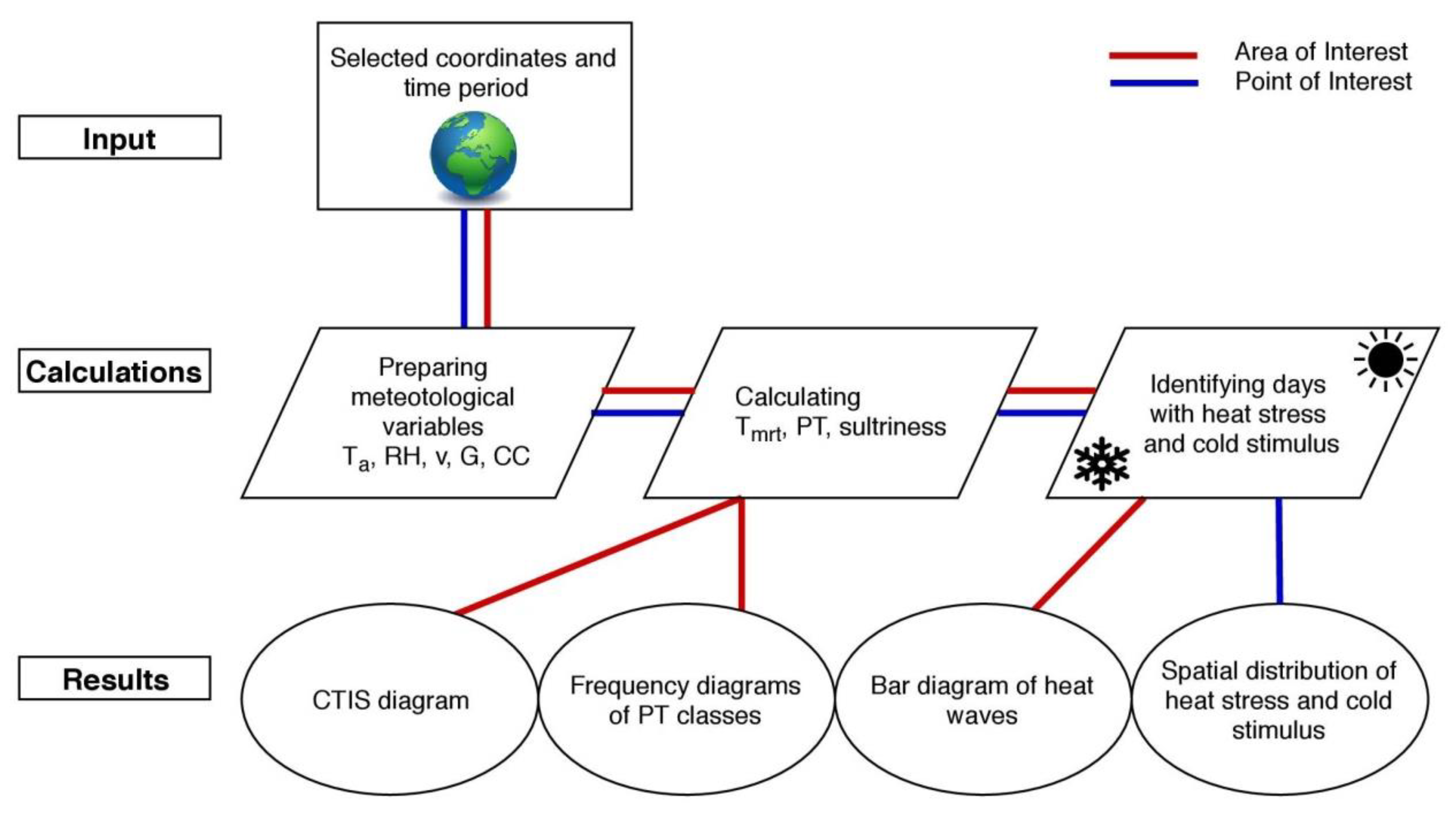
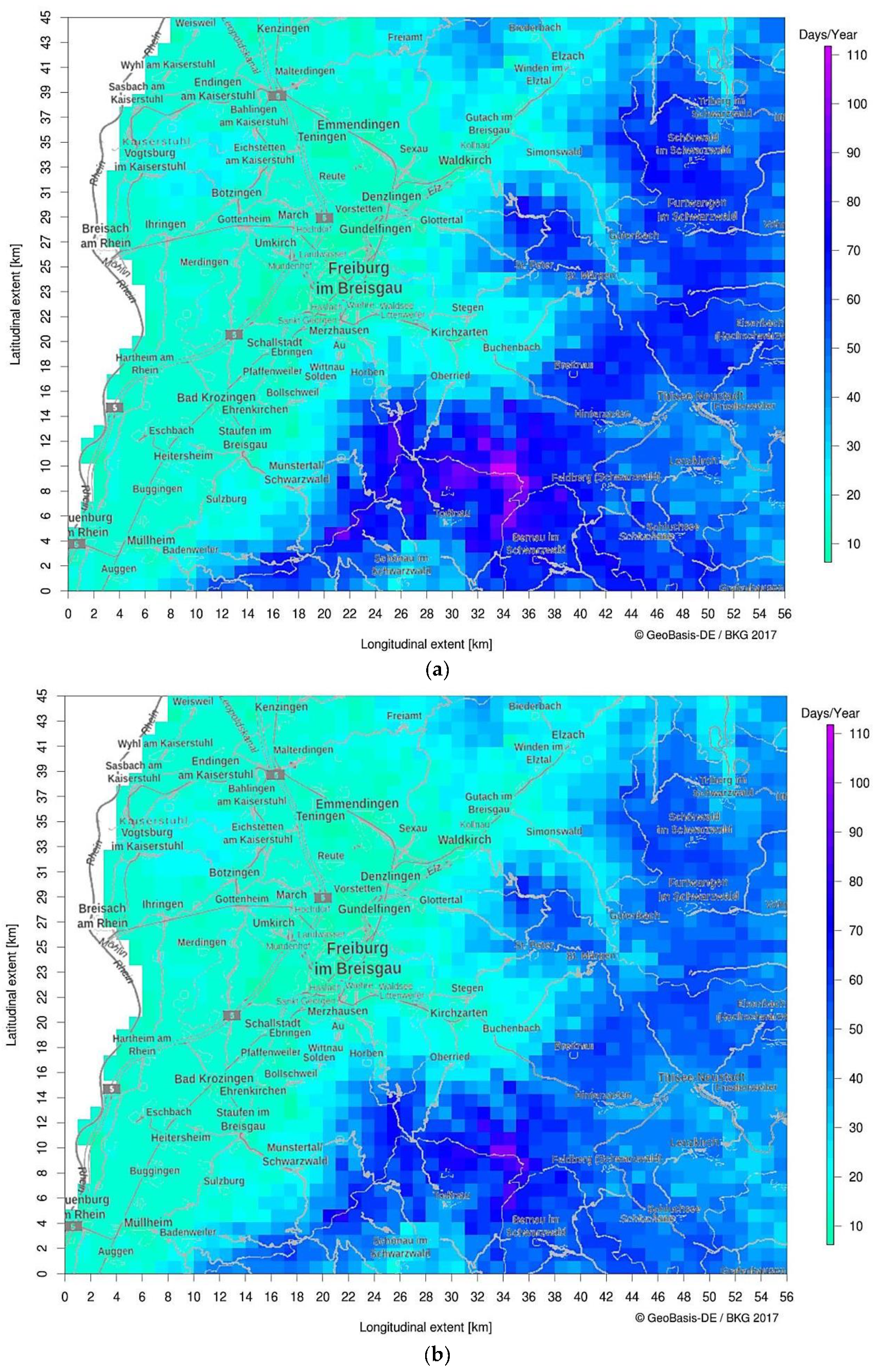
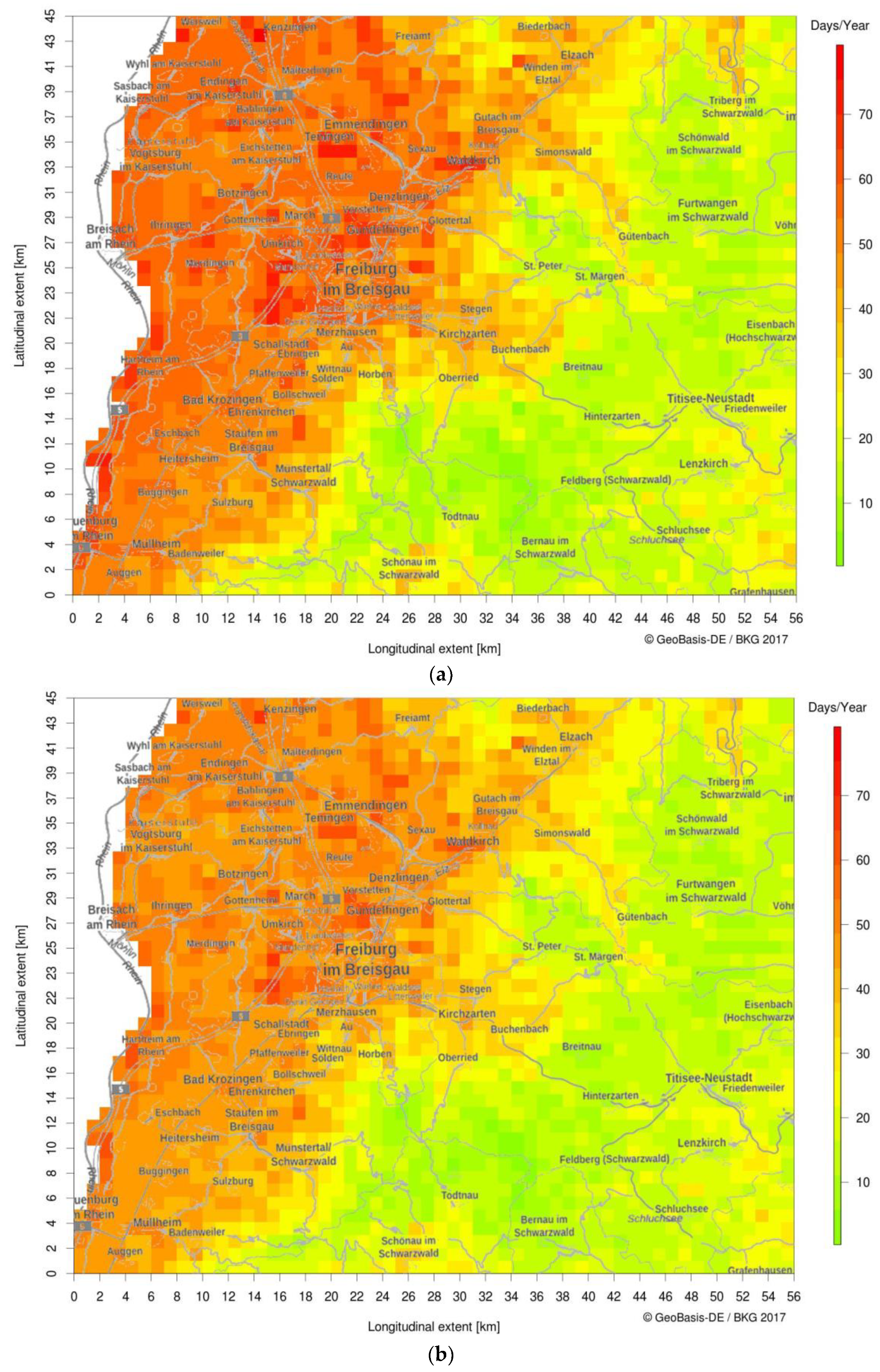
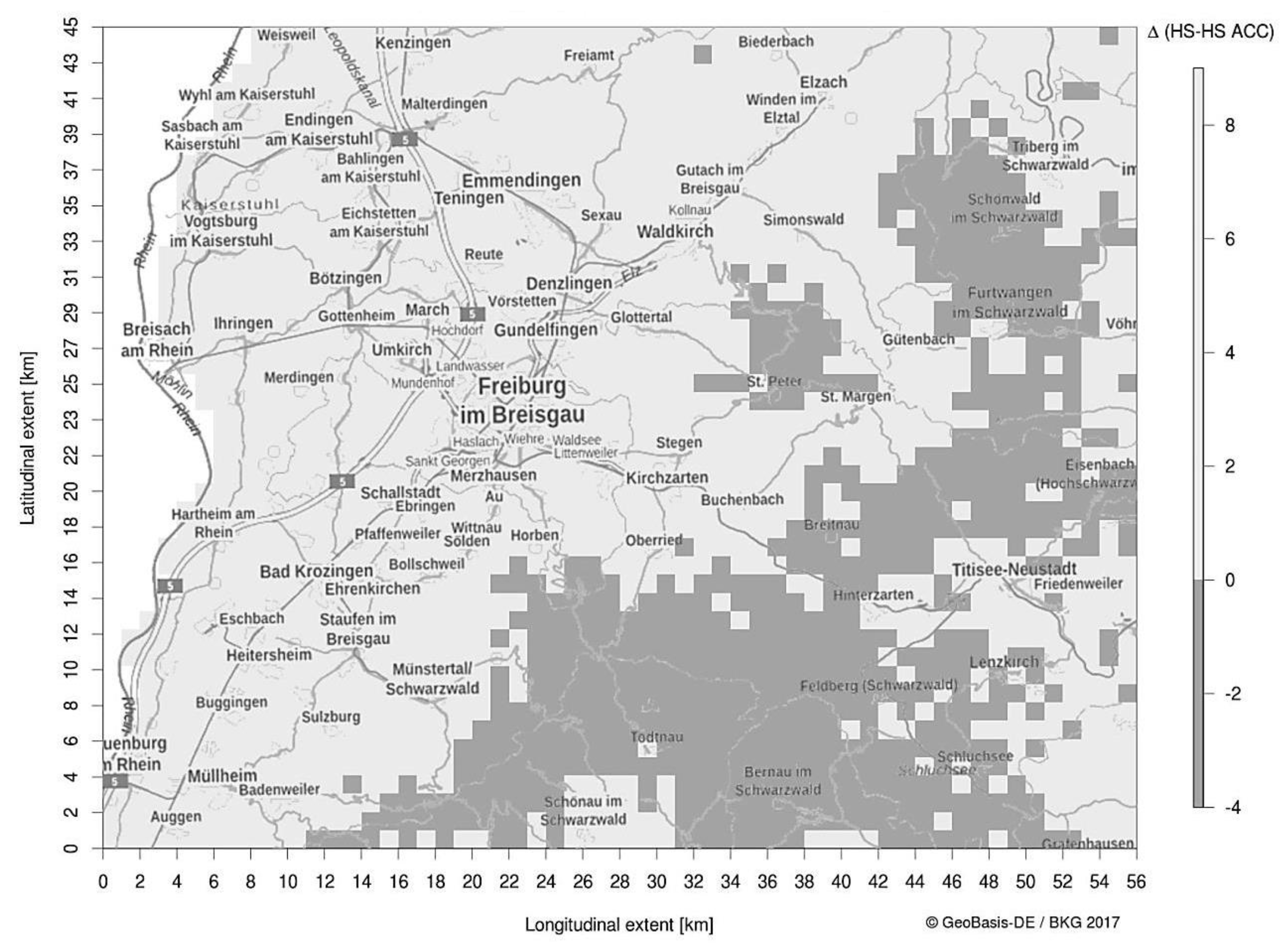
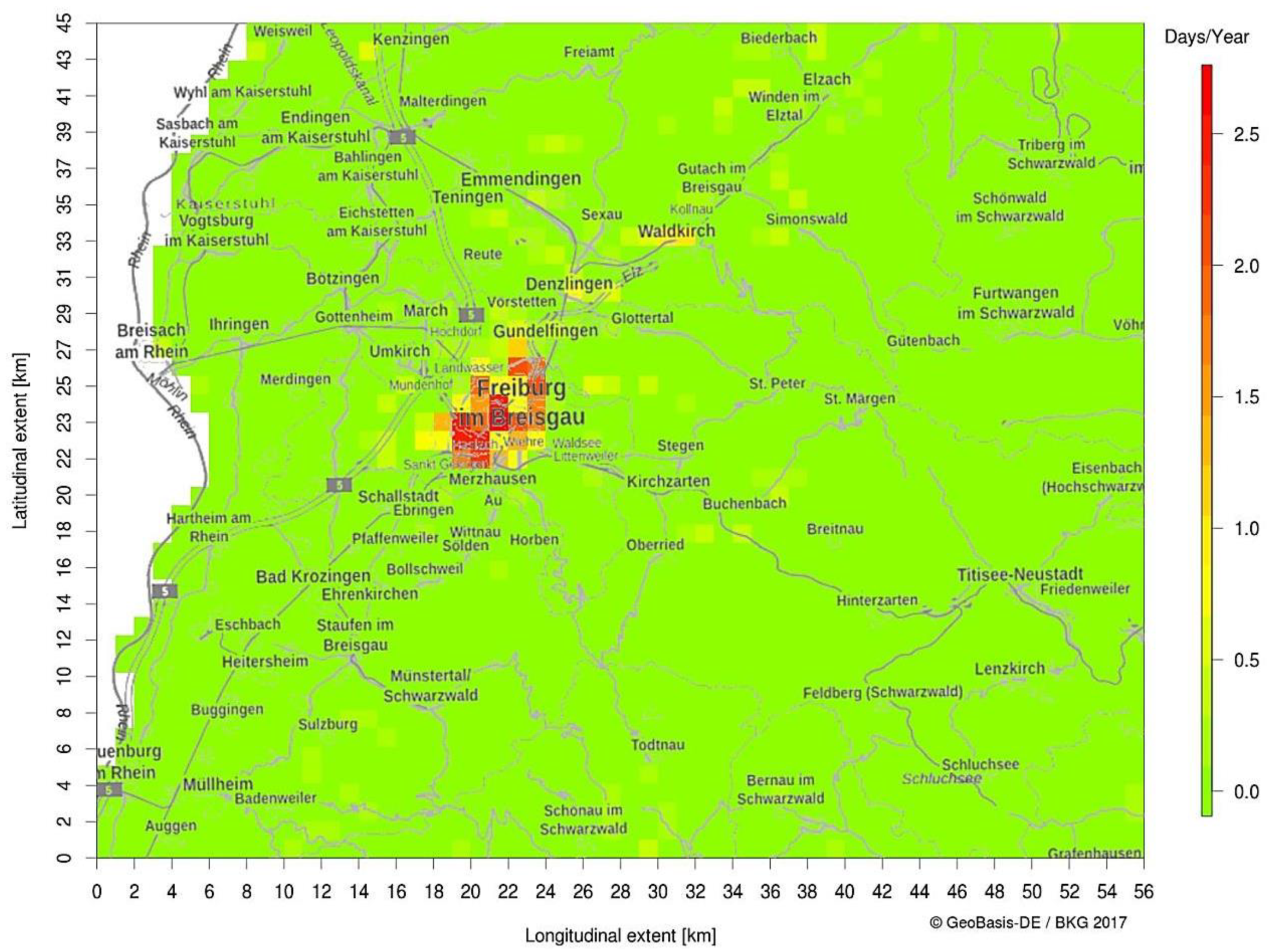
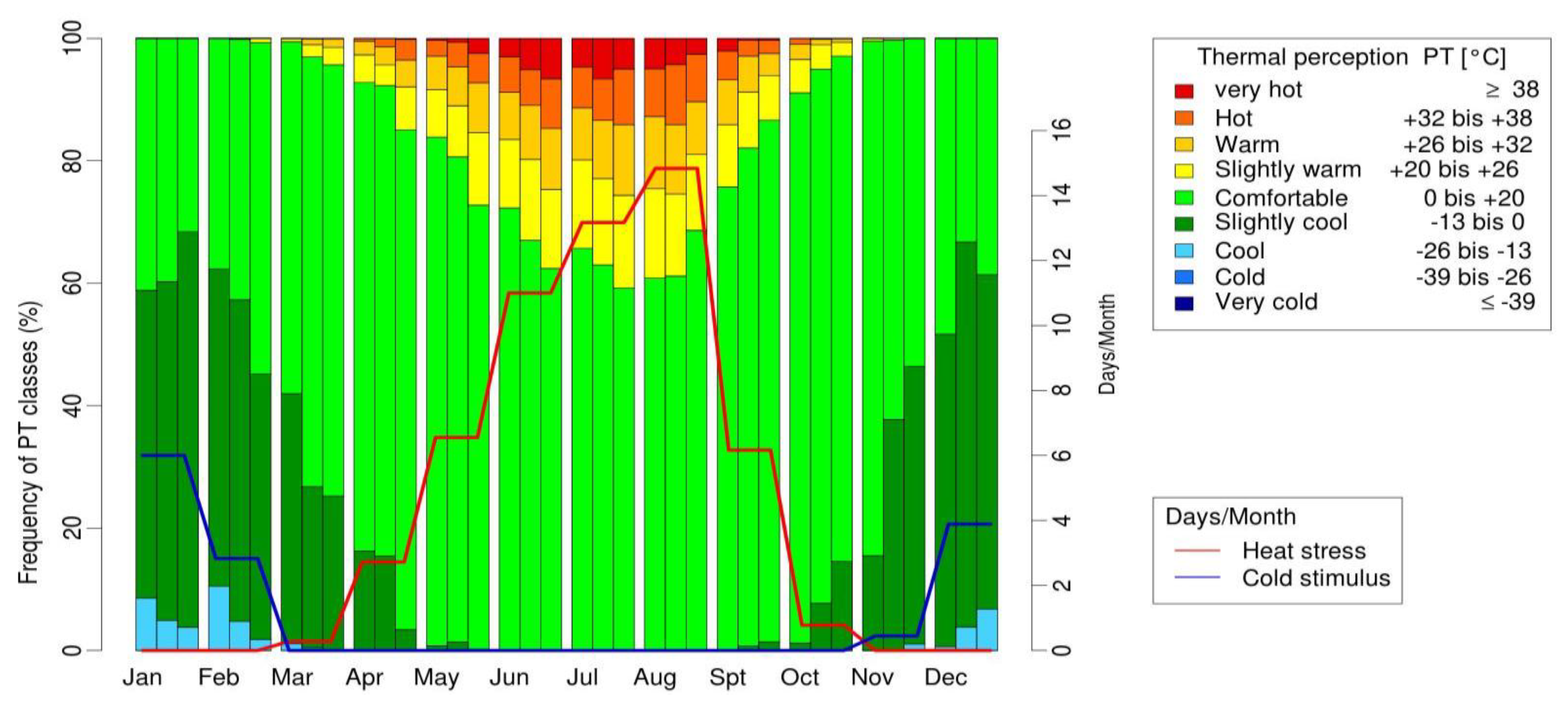
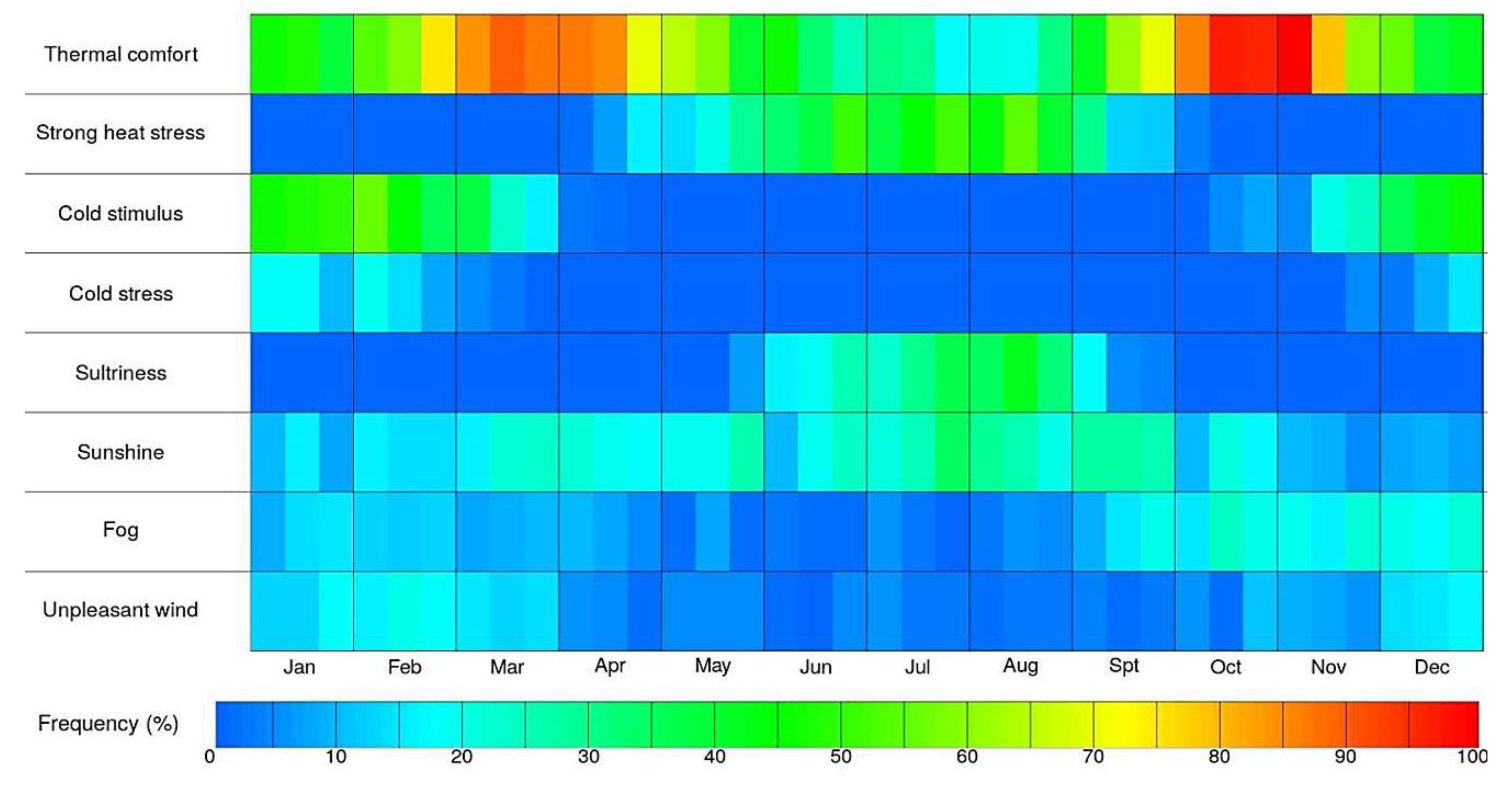
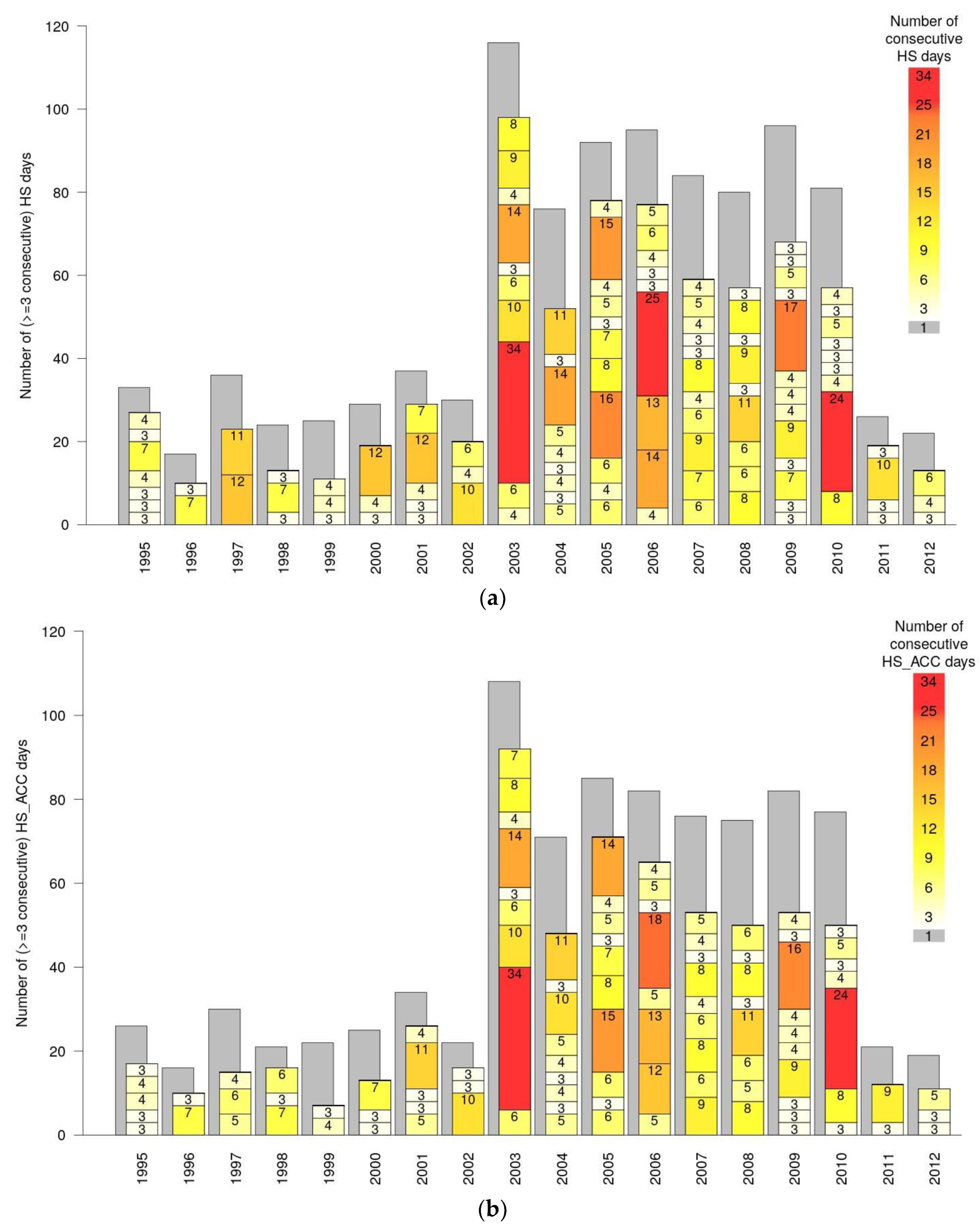
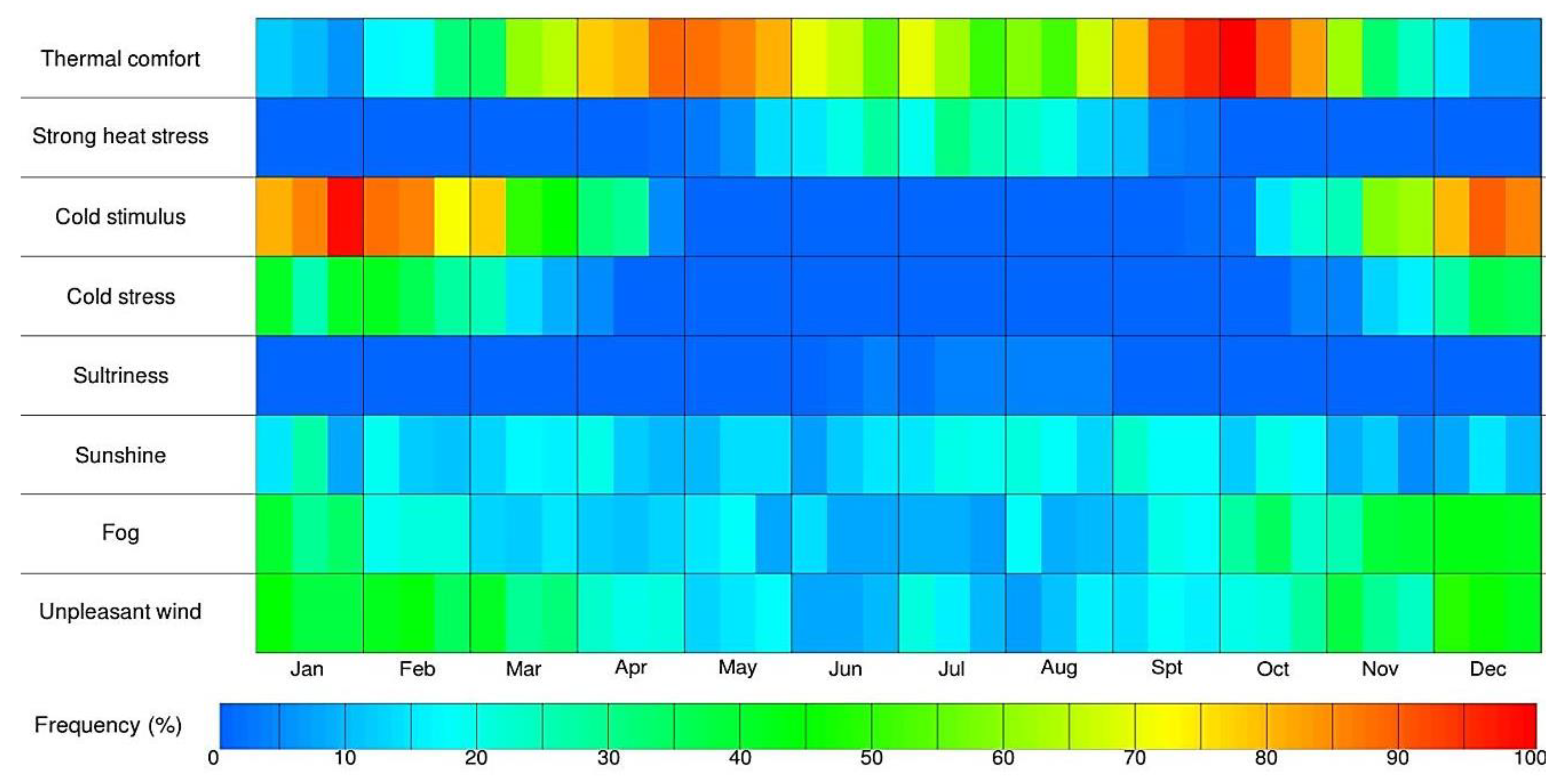
| Climate Variable | Unit | Station Data | Satellite Data | RCM Data |
|---|---|---|---|---|
| Air temperature | °C | X | ||
| Air pressure | hPa | x | ||
| Dew point temperature | °C | X | ||
| Relative humidity | % | X | ||
| Water vapour content | g/Kg | X | ||
| Cloud cover | 1/8 | X | X | |
| Global radiation | W/m2 | X | X | |
| Direct radiation | W/m2 | X | X | |
| Down-welling longwave radiation | W/m2 | X | X | |
| Up-welling longwave radiation | W/m2 | X | X | |
| Wind speed | m/s | X | X | |
| Wind direction | ° | X | X |
| Criteria | Heat Stress | Cold Stimulus |
|---|---|---|
| Time of analysis | 13 CET | 7–19 CET |
| Constant threshold values | THH = 20 °C | THC = 0 °C |
| Condition with constant TH | PT ≥ THH + 12 °C = 32 °C PT ≥ THH + 6 °C = 26 °C plus sultriness | PT ≤ THC − 6.5 °C = −6.5 °C |
| Variable threshold values | 12 ≤ THH ≤ 22 °C | −4 ≤ THC ≤ 7 °C |
| Condition with acclimatisation | PT ≥ THH + 12 °C 24 ≤ THH ≤ 34 °C PT ≥ THH + 6 °C 18 ≤ THH ≤ 28 °C plus sultriness | PT ≤ THC − 6.5 °C −10.5 ≤ THC ≤ 0.5 °C |
| Condition | Threshold Value | Time of Analysis | Minimum Length |
|---|---|---|---|
| Thermal comfort | 0 °C ≤ PT ≤ 2 °C | 7–19 CET | ≥8 h/12 h |
| Strong heat stress | PT ≥ 32 °C | 7–19 CET | ≥3 h/12 h |
| Cold stimulus | PT ≤ −6.5 °C | 7–19 CET | ≥1 h/12 h |
| Cold stress | PT ≤ −13 °C | 7–19 CET | ≥1 h/12 h |
| Sultriness | d_std ≥ 1 | 0–23 CET | ≥1 h/24 h |
| Sunshine | CC < 5/8 | 7–19 CET | 12 h/12 h |
| Fog | RH > 98% | 7–19 CET | ≥1 h/12 h |
| Unpleasant wind | v10 > 8 m/s | 7–19 CET | ≥1 h/12 h |
© 2019 by the authors. Licensee MDPI, Basel, Switzerland. This article is an open access article distributed under the terms and conditions of the Creative Commons Attribution (CC BY) license (http://creativecommons.org/licenses/by/4.0/).
Share and Cite
Schlegel, I.C.; Matzarakis, A. A New Approach for Generating Human Biometeorological Information Based on Gridded High-Resolution Data (Basic Data of Test-Reference-Years). Atmosphere 2019, 10, 334. https://doi.org/10.3390/atmos10060334
Schlegel IC, Matzarakis A. A New Approach for Generating Human Biometeorological Information Based on Gridded High-Resolution Data (Basic Data of Test-Reference-Years). Atmosphere. 2019; 10(6):334. https://doi.org/10.3390/atmos10060334
Chicago/Turabian StyleSchlegel, Irmela C., and Andreas Matzarakis. 2019. "A New Approach for Generating Human Biometeorological Information Based on Gridded High-Resolution Data (Basic Data of Test-Reference-Years)" Atmosphere 10, no. 6: 334. https://doi.org/10.3390/atmos10060334
APA StyleSchlegel, I. C., & Matzarakis, A. (2019). A New Approach for Generating Human Biometeorological Information Based on Gridded High-Resolution Data (Basic Data of Test-Reference-Years). Atmosphere, 10(6), 334. https://doi.org/10.3390/atmos10060334





